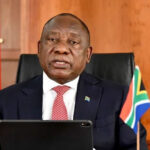Johannesburg – The political landscape of South Africa’s major metros is undergoing a seismic shift, as the ANC appears poised to “unplug” its erstwhile coalition partners, the Economic Freedom Fighters (EFF), from positions of power. This dramatic move, driven by the ANC’s recent realignment at the national and provincial levels, has sent shockwaves through the political sphere, with implications for governance and stability in Johannesburg, Ekurhuleni, and eThekwini.
The ANC’s decision to form a government of national unity with the Democratic Alliance (DA), the Inkatha Freedom Party (IFP), and a number of smaller parties has fundamentally altered the political calculus in the metros, where the ANC previously relied on the EFF’s support. The EFF, in return for its backing, had secured influential positions in the mayoral committees (MMCs) of Johannesburg, Ekurhuleni, and eThekwini.
The cracks in the ANC-EFF alliance began to show in Ekurhuleni, where Mayor Nkosindipile Xhakaza, under pressure from ANC regional leaders, fired the city’s finance MMC, Nkululeko Dunga, the EFF Gauteng chairperson. Dunga was replaced by the ANC’s Jongizizwe Dlabathi, a vocal critic of the ANC’s relationship with the EFF.
“We have had incidents where we would agree with Lesufi and the PEC, but when we get to council, we would find leaders at that level telling us what was discussed with the provincial leadership was invalid,” Dunga lamented, highlighting the disconnect between the provincial and regional leadership of the ANC.
The EFF, however, remains confident that their close relationship with Gauteng Premier Panyaza Lesufi will shield them from a complete purge at the city level.
“The EFF’s role in co-governance with the ANC and other parties has contributed to government stability, contrasting with the disruptive intentions of these actions,” Dunga asserted, claiming that the ANC’s regional leaders are motivated by a desire to control patronage.
In Johannesburg, the ANC’s frustration with the EFF’s inconsistent voting record reached a boiling point following the EFF’s opposition to a R2.5 billion loan from the Agence Francaise de Développement. This marked the third time the loan, intended to fund capital expenditure projects, was rejected in council.
“It will be done by the end of the week. We also knew that the EFF will not be voting with us in council,” an ANC leader confided, confirming the party’s intention to remove the EFF’s MMCS.
The decision is likely to face resistance from the ANC in Gauteng, as Lesufi has previously expressed his support for the EFF. However, the ANC’s national leadership, led by Secretary General Fikile Mbalula, has made it clear that a coalition with the EFF is not an option.
“They are supported by the provincial leadership but we are not happy with them. This is happening for the third time. Every time we engage them before council, they tell us that they will vote with us and when we go to council, they ask for caucus breaks and then don’t vote with us,” an ANC source said, outlining the party’s growing dissatisfaction with the EFF’s behaviour.
The ANC’s decision to “unplug” the EFF is a high-stakes gamble. While it may give the party more control over the metros, it could also lead to instability and gridlock. The EFF, for its part, is likely to fight back, using its leverage in the provincial government to protect its interests.
The unfolding drama in South Africa’s metros is a microcosm of the broader political realignment taking place in the country. The ANC’s decision to form a government of national unity with the DA and IFP is a recognition of the party’s declining electoral fortunes. However, it also signals a shift in the ANC’s strategy, as it seeks to consolidate its power at the national level while maintaining its grip on key municipalities.











